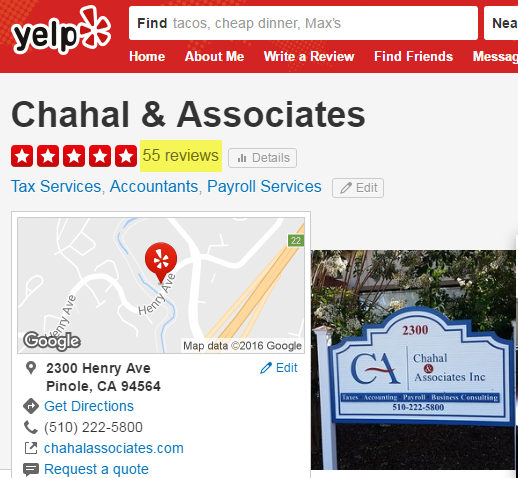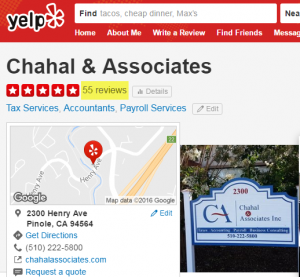

Developing a 5 Star Online Reputation
| |
In today's online world, 85% of consumers say that they read online reviews about local businesses as part of their decision making process. Whether this is looking online for a movie, restaurant, contractor or hiring an accountant, we all use online reviews to lower our risk of a bad experience.
There are review websites that rate contractors, employers, products, doctors, and all kinds of professional services. These online review websites make the world more transparent for buyers and shoppers of all kinds. Eventually, it will be very hard to hide underneath the online review radar screen.
Focus Your Efforts
Because obtaining reviews takes a concerted effort, we recommend that you focus your efforts on the review websites that will give you the highest return. Typically, this means trying to obtain reviews from your clients in Google, Yelp, and Intuit Find-a-ProAdvisor. We would recommend skipping things like Angie's List, Judy's Book, and smaller review websites. For our industry, they just don't have enough market share to support the effort.
What Is Taboo
The review websites take reviews to heart and go the extra mile to protect their brand. For example, Yelp actually reviews nearly all of your reviews and looks for patterns to filter out fake reviews. Google looks at your IP address to see if the review is the same IP address as the business and filters this out. Here are some of the things that are taboo in this new online review world:
- Placing testimonials on my website – In today's jaded world, most website prospects will tend to ignore your carefully crafted testimonials on your website. That's because most realize that you ignore the negative reviews, only show the positive reviews, and probably wrote the review for your client. Quite frankly, negative reviews often are very enlightening and helps the buyer more than you realize. For example, Amazon has made this into a major selling point for their online reviews (e.g., best/worst review).
- Asking clients for reviews – Yelp has a policy of discouraging businesses from asking clients to post happy reviews. One way that they spot this is if your accounting firm has 0 reviews for years and then all of a sudden, gets a few in one day. To avoid getting filtered out, space out your reviews over time so they appear more organic. However, it is fine to make customers aware that you encourage their feedback and online reviews. Yes, this is a subtle difference.
- Fake reviews – This is a major no no and has consequences. In 2013, Samsung was fined over $340,000 for building fake reviews. In NYC, there was a major sting operation called Operation Clean Turf and fines totaling over $350,000 were dished out to 19 companies for fake Yelp reviews.
Process We Recommend
The process for Google, Yelp and Intuit are very different. Below is my recommendation on how you can proceed down this path and develop a 5 star reputation online. I will assume that your back office is worthy of 5 star reviews and seldom has complaints.
- Local Listings – To obtain reviews, you must "claim" your business in Google and Yelp.
- Google – To obtain reviews in Google, the person posting the review must have a Google account of some kind (e.g., Gmail, Google+, etc.) to authenticate who they are. While a pain, we all have to play by Google's rules given their market share. Their intentions are valid because they want to validate your identity before posting your online review on their review service.
 Yelp – Given the filtering process that Yelp has created to weed out suspicious reviews, we recommend posting a few reviews of your favorite restaurants. After posting 3-4 online reviews, then you should post online reviews for business clients that you genuinely support and recommend. Pace this out gradually at say 3-4 per day. Start with business clients that will appreciate this the most like restaurants, retail outlets, fitness trainers, subcontractors, etc. In other words, pay your clients a compliment forward by scratching their back before asking them to reciprocate for your accounting practice.
Yelp – Given the filtering process that Yelp has created to weed out suspicious reviews, we recommend posting a few reviews of your favorite restaurants. After posting 3-4 online reviews, then you should post online reviews for business clients that you genuinely support and recommend. Pace this out gradually at say 3-4 per day. Start with business clients that will appreciate this the most like restaurants, retail outlets, fitness trainers, subcontractors, etc. In other words, pay your clients a compliment forward by scratching their back before asking them to reciprocate for your accounting practice.- Intuit Find-a-ProAdvisor – If you want more QB clients, then create a profile within Intuit's Find-a-ProAdvisor website fully and support the profile by obtaining QB Certifications. Then, create a list of satisfied QB clients. These reviews will be the easiest to get posted.
Having a solid online reputation generates leads, increases your conversion rate on prospects, and creates word-of-mouth advertising benefits that benefit your practice in ways you never anticipated.



